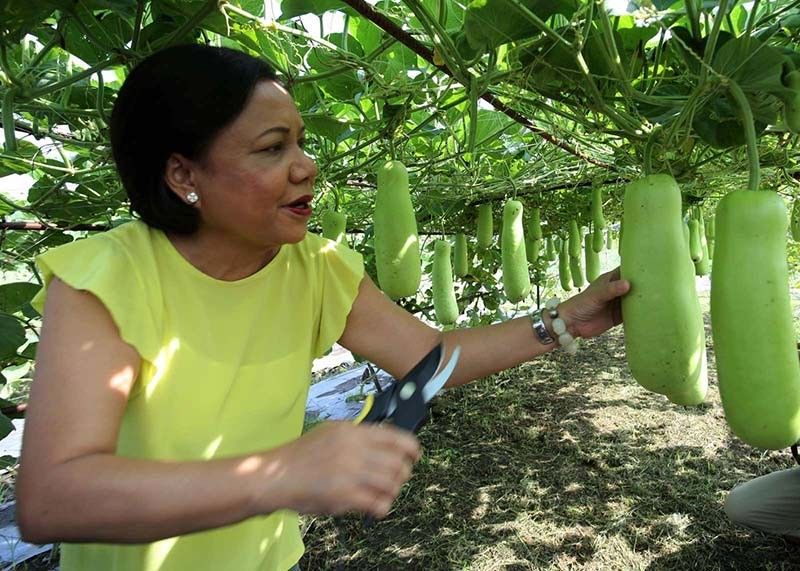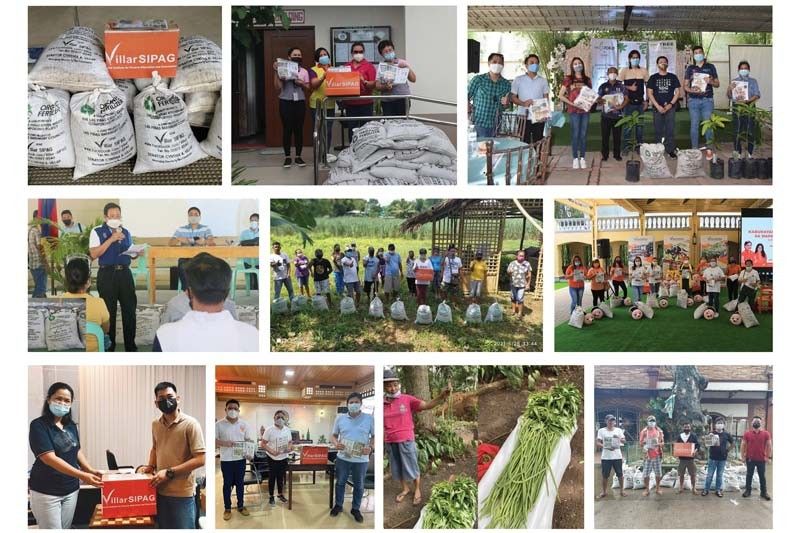Villar Sipag Home Gardening Program champions food security, nutrition and income

MANILA, Philippines — Villar Social Institute for Poverty Alleviation & Governance (Villar Sipag), is a non-stock, non-profit organization established in 1995, which aims to support projects geared toward helping less fortunate countrymen break free from the clutches of poverty.
It is anchored on “sipag” or hard work coupled with perseverance (tiyaga), which are core values that the Villar family holds in high regard in themselves and in other people as well.
The foundation also works for environment protection, assistance to overseas Filipino Workers, entrepreneurship, livelihood generation and job creation.
Other programs are tree planting, development of culture and arts, health social services, entrepreneurship as well as other poverty-reduction projects.
The program
Even before the coronavirus pandemic, which has afforded people to spend more time in the comforts of their homes, Sen. Cynthia Villar has been leading the campaign on vegetable gardening, distributing seeds and organic fertilizers all over the country, while enticing people to grow their own food thru Villar Sipag.
The senator, who is the current chairperson of the Senate Committee on Agriculture and Food, is on the frontline of pushing gardening and composting—turning kitchen and garden wastes into organic fertilizers.
"I've always advocated home gardening as a strategy for food security and for the alleviation of nutrient deficiency. It is a big help for families to have direct access to healthier food and fresh vegetables. They don't have to buy them in the market. They can even earn from it," she said.
Aside from seedlings, the senator has been distributing organic fertilizer, also for free, all over the country. It is the product of composting of kitchen and garden wastes.
Villar Sipag has 108 composting facilities, 68 in Las Pinas and Bacoor and 50 through the Vistaland communities all over the Philippines.
The beneficiaries
Seeds, compost and brochures on how to do home gardening were distributed to LGUs, congressional districts, private individuals, in homeowners’ associations and organizations, private and public schools, farmers thru their cooperatives and associations.
The following cities and provinces per region received the seed packs from Villar Sipag: National Capital Region (Las Piñas, Pasig, Pasay, Muntinlupa, Marikina, Quezon City, San Juan, Manila, Parañaque and Taguig), Region I (Pangasinan, La Union, Ilocos Norte, Ilocos Sur), Region II (Nueva Vizcaya, Isabela and Quirino), Region III (Bulacan, Pampanga, Nueva Ecija, Tarlac, Zambales and Bataan), Region IV A (Cavite, Batangas, Rizal, Quezon), Region IV B (Palawan, Marinduque Oriental Mindoro and Occidental Mindoro), Region V (Albay, Masbate, Cam Sur and Catanduanes), Region VI Western Visayas (Iloilo, Guimaras, Antique, Aklan, Negros Occidental and Capiz), Region VII Central Visayas (Negros Oriental, Bohol, Cebu, Siquijor), Region VIII Eastern Visayas (Biliran, Southern Leyte, Leyte, Eastern Samar and Samar), Region IX (Zamboanga City, Zamboanga del Norte, Zamboanga Del Sur),Region X (Misamis Oriental, Misamis Occidental, Bukidnon, Lanao Del Norte), Region XI (Davao Del Sur, Davao Oriental, Davao De Oro, Davao Del Norte, Davao City),Region XII (Sarangani,North Cotabato, South Cotabato) Region XIII ( Agusan Del Norte, Agusan Del Sur, Surigao Del Sur, Surigao Del Norte, and lastly, Bangsamoro Autonomous Region in Muslim Mindanao (Maguindanao).
The seed packs that were distributed across the Philippines amounted to 31,207 as of July 2021 and still counting.
Villar SIPAG distributed vegetable seed packets and compost to the following nationwide:
- 35 congressional districts
- 33 provinces
- 304 cities and municipalities
- 53 cooperative and farmers associations
- 29 schools
- 50 non-government organizations
- 3,795 individuals
Furthermore, Villar Sipag has farm schools that were established to give free training in agri crops production, rice farming, native animal production and aquaculture.
The two farm schools in 2020 produced a total of 2,000 plus graduate trainees a year. It stopped its operation in March 2020 due to quarantine restrictions but in October 2020, Villar SIPAG Farm School in Las Piñas-Bacoor and San Jose del Monte City re-opened and resumed their training programs for agri crops production again conducted by East West Seeds Foundation.
The quarantine restrictions did not stop Villar Sipag from imparting knowledge and training to the Filipino farmers as they erected two additional farm schools.
The existing health protocols during that time compelled them to have shortened sessions to four full days a week with 25 participants per batch.
The participants have to undergo COVID-19 testing and practice social distancing, hand washing, foot bath, wearing of mask and face shield.
By giving away vegetable seeds and teaching people how to farm, the people who lost their jobs, including those who can’t buy their own food in the market—started cultivating their land.
These families received food packages from different organizations and chose not to depend on these alone by growing their own garden. Home gardening is essential because of its contribution to food security and self-provision—a buffer against high food prices.
Villar Sipag continues to promote urban and home gardens because they believe that by teaching the people how to grow their own food, they will have easy access to healthy and nutritious food.
The result

The outcome of Villar Sipag actions ultimately unfolds when lockdown restrictions in the Philippines continue even to this day.
In less than a few months since May 2020, the people who received the vegetable seeds were able to grow their own food. They were able to cut down their food expenses and most especially, had more nutritious meals.
Villar Sipag farm schools boost the income of the farmers as well. Trainees were able to apply the knowledge they received to their own farm, however, it did not end there, these farmers that were trained by Villar Sipag as a trainer shared their knowledge to their community as well, thereby impacting the lives of many Filipino farmers.
It contributed to the country’s food security during pandemic and further develop the agriculture sector in the Philippines.
“Maraming salamat po Senator Villar sa iyong programa.Ito ay sagot lalo na ngayong panahon ng pandemya. Malaking tulong upang maging malusog at masigla ang pamayanan,lalo na sa mahihirap nating kababayan sa bayan ng Hinoba-an,” said Mayor Ernesto Estrao of Hinoba-an, Negros Occidental in appreciation of the senator’s initiative.
- Latest

























